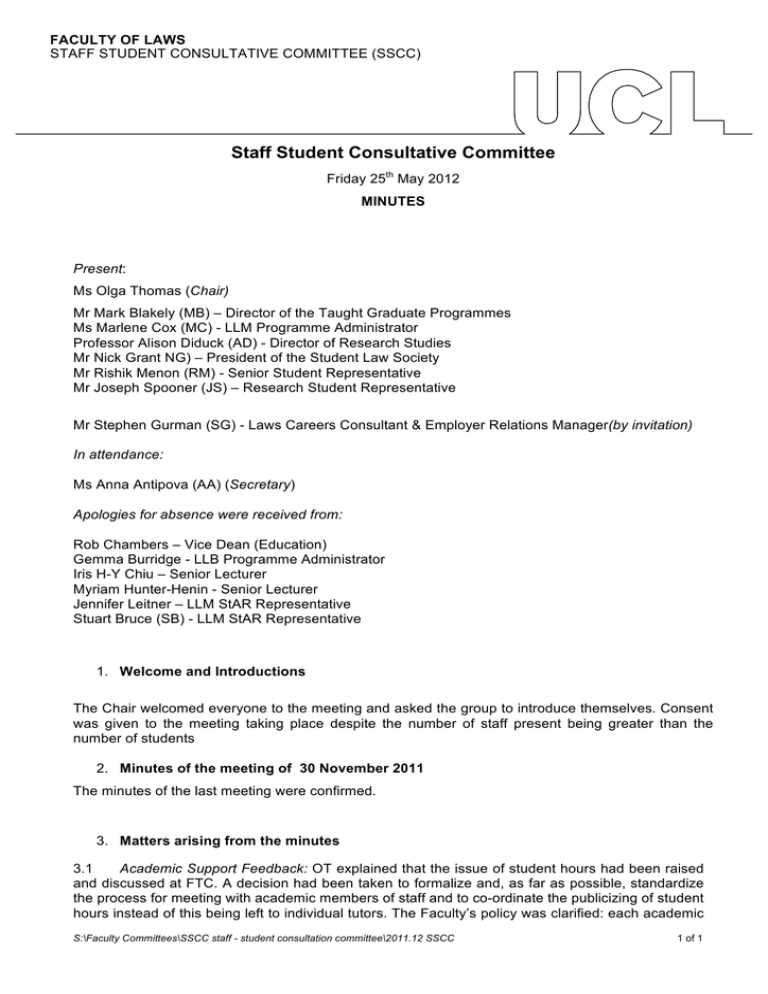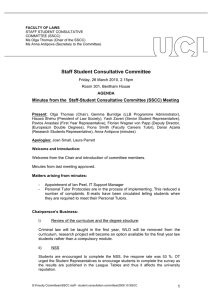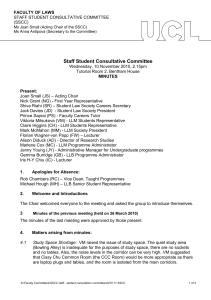Staff Student Consultative Committee
advertisement

FACULTY OF LAWS STAFF STUDENT CONSULTATIVE COMMITTEE (SSCC) Staff Student Consultative Committee Friday 25th May 2012 MINUTES Present: Ms Olga Thomas (Chair) Mr Mark Blakely (MB) – Director of the Taught Graduate Programmes Ms Marlene Cox (MC) - LLM Programme Administrator Professor Alison Diduck (AD) - Director of Research Studies Mr Nick Grant NG) – President of the Student Law Society Mr Rishik Menon (RM) - Senior Student Representative Mr Joseph Spooner (JS) – Research Student Representative Mr Stephen Gurman (SG) - Laws Careers Consultant & Employer Relations Manager(by invitation) In attendance: Ms Anna Antipova (AA) (Secretary) Apologies for absence were received from: Rob Chambers – Vice Dean (Education) Gemma Burridge - LLB Programme Administrator Iris H-Y Chiu – Senior Lecturer Myriam Hunter-Henin - Senior Lecturer Jennifer Leitner – LLM StAR Representative Stuart Bruce (SB) - LLM StAR Representative 1. Welcome and Introductions The Chair welcomed everyone to the meeting and asked the group to introduce themselves. Consent was given to the meeting taking place despite the number of staff present being greater than the number of students 2. Minutes of the meeting of 30 November 2011 The minutes of the last meeting were confirmed. 3. Matters arising from the minutes 3.1 Academic Support Feedback: OT explained that the issue of student hours had been raised and discussed at FTC. A decision had been taken to formalize and, as far as possible, standardize the process for meeting with academic members of staff and to co-ordinate the publicizing of student hours instead of this being left to individual tutors. The Faculty’s policy was clarified: each academic S:\Faculty Committees\SSCC staff - student consultation committee\2011.12 SSCC 1 of 1 member of staff is required to make himself/herself available for 2 hours per week for meetings with academic or personal tutees. Part-time teaching staff do not have personal tutees and are not required to have student hours; their academic tutees should raised subject-related queries with the course convenor or relevant lecturer. A list of the student hours of all staff will be compiled at the beginning of the academic year term and publicized to students. Tutors will also be encouraged to post their student hours outside their offices. ACTION POINT: OT to ensure that the student hours list is compiled and posted outside the Undergraduate, Postgraduate and Academic Services offices, in the student common room and on the student intranet.. 3.2 National Student Survey 2012: OT reported that the Faculty of Laws met and in fact exceeded the publication threshold of the NSS and achieved its highest response rate to date with 56% of finalists responding. OT explained that results will be made available to the Faculty in the autumn term and presented in the next meeting of SSCC. 3.3 Higher Education Achievement Report (HEAR): OT explained that from 2011 all UCL undergraduate students who first enrolled in 2011 will receive a Higher Education Achievement Record (HEAR):a document that will record student academic achievement in more detail than the present transcript and will include more detailed module information and verifiable non-academic student achievement undertaken as a result of being a registered UCL student. OT thanked the student body for assisting her in compiling a list of all the extra-curricular activities undertaken within the Faculty which had now been submitted to the HEAR working group.. 4. Chairperson’s Business 4.1 Appointment of Law Careers Consultant: OT introduced SG and his post as Laws Careers Consultant & Employer Relations Manager to the students and explained that with the appointment of SG the Faculty will be expanding the careers programme for students.. SG explained his role and noted that he will be building on the work of Prince Saprai, former Faculty Careers Tutor, and Patrice Ware, UCL Careers Service, when addressing the career needs of students. Students will also now have access to bespoke careers one-to-one sessions in the Faculty offered by SG Monday-Thursday. A survey will be circulated at the end of the academic year to assess the student satisfaction with this new provision. 4.2 Student Law Society Committee: OT reported that a new Student Law Society Committee had just been elected into post. She took the opportunity to thank the outgoing committee members for their excellent work and the exceptional number and breadth of events and student activities organised during 2011-12 and to congratulate them on their success in Mooting and other competitions. She also expressed gratitude for their engagement in a healthy dialogue with the and hope that an equally collaborative relationship can be developed with the new committee. 5. International Student Barometer OT presented the Student Barometer and International Student Barometer (SBISB 2011-12) data, thanked the student body for taking part in this survey and placed emphasis on its usefulness to the Faculty, particularly as compared to the NSS. The data relating to learning satisfaction was reviewed and the Faculty’s particularly strong performance and improvement in the quality of lectures, academic course content, organisation and smooth running of courses and virtual learning environment, which exceeded both the UCL and the UK averages, were noted. Reference was made to the Faculty’s successful implementation of the minimum Moodle requirements in all courses as a possible explanation for the high satisfaction rate for virtual learning environments. Concerns were raised by the Faculty’s performance in relation to Learning Support/ Getting Time from Academic Staff, which is considerably lower than UCL and the national average. It is hoped that the implementation of the Student Hours policy will help improve this. It was noted that satisfaction rates relating to coursework feedback remain higher than elsewhere in UCL but still below the national average despite the introduction of the student feedback form and it was agreed that we should continue monitoring this closely. It was also noted that the Barometer also indicated that the top three decision-making criteria of applicants choosing UCL Laws were teaching quality, Institutional/Qualification/ Departmental reputation and rankings and that 56% of students were influenced in their decision to choose UCL Laws by friends (who were/had been students here). The quality of the student experience was therefore of paramount importance in terms of recruitment. 6. Laws Annual Monitoring Report 2010-11 The Laws Annual Monitoring Report was considered. It was felt that the comment in section C as to there being “nothing that can be done about these (library) problems” was inappropriate and that mention should at least be made of the Faculty’s attempts to secure further library resources. The indication in part B of the Student Evaluation questionnaires section that there were no key strengths in the Faculty’s teaching was considered odd and the student representatives confirmed that positive comments had been made about the Faculty’s practices during the evaluation exercise. ACTION POINT: OT to communicate comments to Professor Rob Chambers, the author of the report. 7. Student Issues 7.1 Jurisprudence essay – NG reported that there did not appear to be any standardised guidance on quantity or quality of feedback provided by Jurisprudence essay supervisors and that students were unclear as to what their expectations should be or disgruntled as to the variance in feedback quantity. ACTION POINT: OT to discuss the matter with the course convenor and ensure that guidance is issued to individual supervisors . 7.2 European Union Law and Human Rights LLB Module – RM expressed concerns that students were not clear about the exam format in this subject. OT explained that this was the first year in which the course had been run but that email communications and Moodle postings had been sent to all students by both the EU Law convenor in the first term and the Human Rights convenor clarifying the format of the exam.





